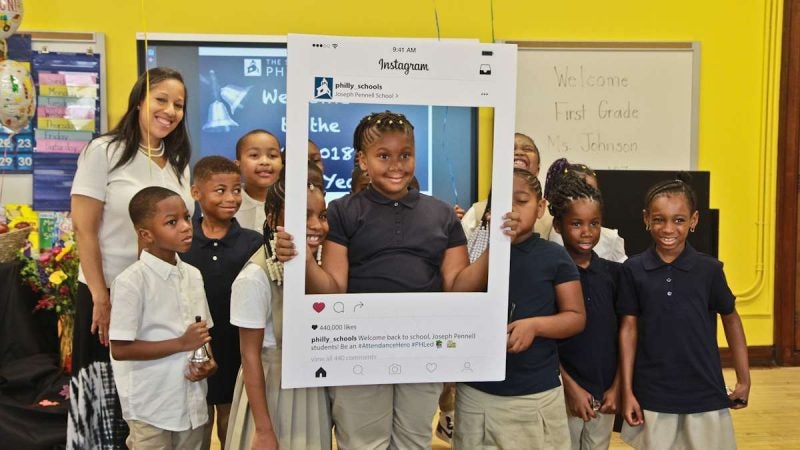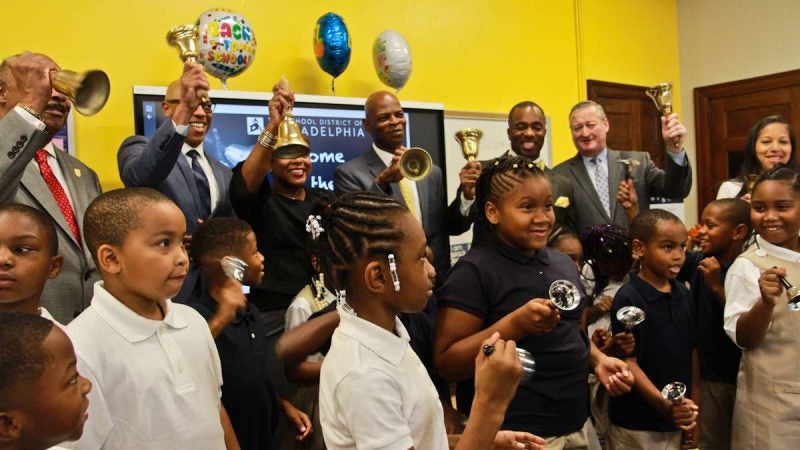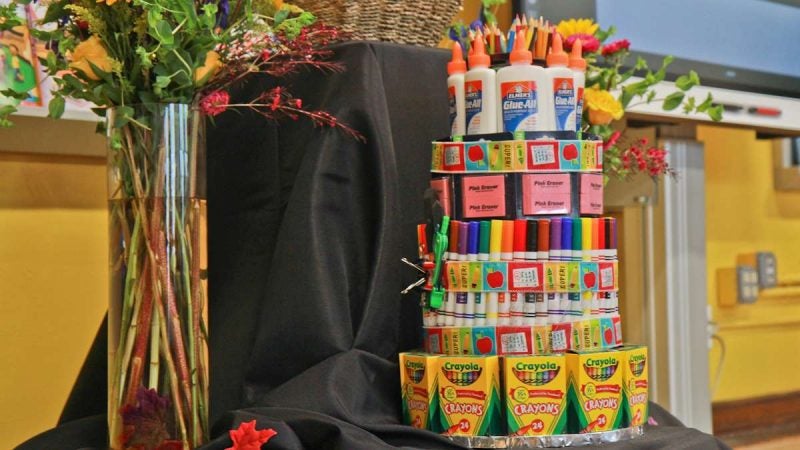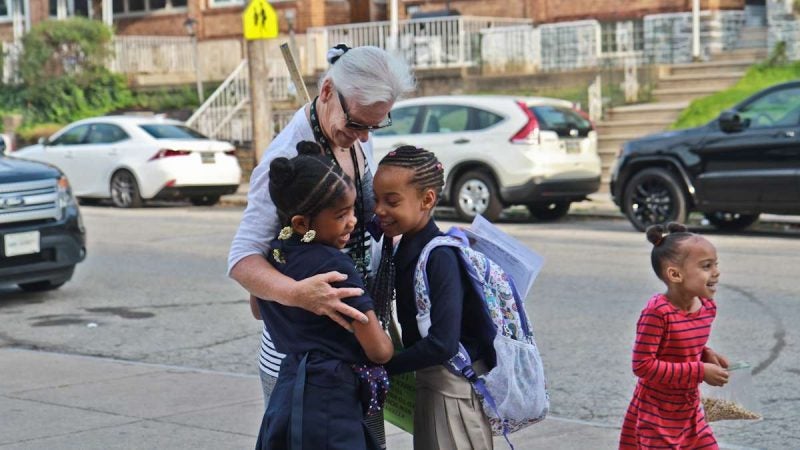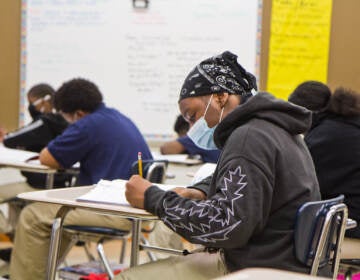As school begins anew, NewsWorks talks with Philly superintendent William Hite
ListenSuperintendent William Hite made a joke.
When I sat down with Hite last week for an interview and asked him to state his name and title —standard practice for radio reporters — he responded with my name and title.
Ok, so maybe it wasn’t quite a joke. But it did sound uncharacteristically playful for a leader who — at least in public meetings — tends to play the straight man.
Perhaps he was loopy from three days of back-to-school media interviews. Or perhaps this breezier version of Hite was always there, buried under years of bad news and grim prognoses.
This year Hite didn’t have to answers questions about school closings or staff layoffs or fiscal deficits.
“Stability” is the buzzword around district headquarters these days.
For the first time since Hite took the head job in October 2012, Philadelphia’s public school system begins the year with a small fund balance and contracts signed for almost all unionized employees.
We sat down with Hite to ask him some questions about this school year and the unsettling challenges that lie ahead.
Please note, the following interview has been condensed for length and clarity.
Q: This is your sixth school year at the helm. Does this one feel different than the other five?
A: It feels a heck of a lot more stable. The fact that we have contracts with our major unions — most recently with the [Philadelphia Federation of Teachers] and now with the administrators — definitely feels more stable. And it feels more focused on things that matter for young people. So in that regard this feels much better than the previous openings. Because those previous five openings were done facing some looming crisis. And that’s not how we’re starting this year.
Q: Do you think it changes the mood on the ground at all?
A: From my anecdotal walk through the eight schools I’ve been to this week already, it feels more exciting. It feels like individuals are excited to welcome children back on Tuesday. And the anxiety is like a positive energy anxiety. That’s very different from how we started in the past years.
Q: So what are you most excited for this year?
A: I’m most excited for the progress that we’ve made in the past. We’re making progress on the things we’ve said matter. Children reading on grade level — we’re making progress there. And I’m very excited about that. Children graduating from high school — we’re making progress there.
Q: When you say you’re seeing progress toward all students reading on grade level, where are you seeing evidence of that progress — besides anecdotal?
A: It’s not anecdotal. We’ve seen it on third-grade PSSAs (Pennsylvania System of School Assessment tests), fourth-grade PSSAs, and we’re seeing it on reading levels for children in kindergarten and grades one and two. So the whole trend is moving in a positive direction. And that will only build as the Read By 4th campaign supports that work, the philanthropic community supports that work, and the mayor’s office supports that work through his Pre-K initiative. So this will only build in terms of the progress that we’re seeing. And while [this year’s] PSSAs have not been released yet, when they are released you will see gain both at the third-grade level and at the fourth-grade level.
Q: You’ve said this over and over again, after this school year, after this fiscal year, you have to face the deficits again. What’s your plan avoiding another round of fiscal crises?
A: I think it’s really important we all come together to ensure we don’t revisit what we had to experience four years ago or three years ago. We started talking about this three years ago so it’s not all of a sudden that we need this in order to fill this gap, but instead it is a plan to create sustainable and recurring revenues so that the district is not going year to year thinking what do we need to remove or replace?
No one should allow us to have to peel back the things that we’ve done to date in order to rebuild the momentum in the schools here in Philadelphia. We’re appreciative of the funding that has come from the city. We’re appreciative of the additional revenue that has come from the state. But there’s still a lot of work to do. We’ve been talking about this problem for three years,that we are approaching a cliff. If we don’t do something then we will have to make hard decisions all over again that could then systematically undo many of the advancements that we’ve made and undo some of the progress we’re experiencing here in Philadelphia.
Q: What can you do beyond simply talk about and raise awareness? And I know not everything you do is in the public eye, but there must be some strategy beyond saying it over and over again in public?
A: We’re working with all of our funders so that they also understand this problem and this issue. It’s not new to them, either. They’re working to resolve the budget for this year. But even as we talk about that, though, the strategy has to be in the hands of those individuals who are making the decisions to generate more revenue. Our strategy is to ensure they’re fully aware of what those things are. We’ve done a lot to become more responsible fiscally. As I indicated before it would be problematic and a shame, quite frankly, if we have to in fact now begin peeling back some of the investments that we’ve made in schools.
Q: We still have, by my count, over 10 charter schools that are in some form of limbo. Either they didn’t sign their agreements or the SRC just never acted on the district’s advice. Does that trouble you? What’s the strategy to fix this?
A: I think that’s a process. I think the SRC is working through a process to at least call for the question and bring it to a decision point so that individuals have the ability to vote. I think that it was irresponsible to take that on when there wasn’t a full slate of commissioners on the commission. And a large part of this conversation was during that time when it wasn’t fully formed. There weren’t five commissioners there. However, now that there are five commissioners, it’s time to bring these things to a decision, make the decision, up or down, or right or left, however we wanna look at it.
Q: Should the School Reform Commission be dissolved, and if so on what timeline?
A: I generally don’t talk about governance. I’m the employee of the commission. I would be the employee of whatever the governance structure is. I will say this, though: All of the hard things that we’ve had to do here in the School District of Philadelphia would not have changed if there was different governance. We still had those hard things to do. The only thing that would have changed those hard things we had to do, would have been more funding. So we also have to make sure we fix the structural problem. I’m all for local control. And I think that it’s important here in Philadelphia just like it is everywhere else. But by the same token we still had financial challenges that were very significant that forced us to do a lot of hard things. Changing the governance structure would not have changed any of those things given our fiscal position during those times.
Q: But you said philosophically you do like the idea of local control.
A: Sure. I’m mean local control is, I mean that’s important. And the five commissioners are all local. It’s not like they’re coming from other places. But they do live here in Philadelphia [and] understand Philadelphia issues. But who would not be for local control? I live in Philadelphia. I mean I think there shouldn’t be some other entity that controls it. I do think, though, that we have to solve all of our problems as we think strategically about this — not just the one governance problem. We have to solve our structural problem. We have to solve the funding problem.
Q: Enrollment in the district for the past three years, it’s actually been pretty stable after years of decline. Is that a blip? Are we going to slide back into the decline phase?
A: We’ve seen an era of enrollment stabilization. That’s not accidental. That’s not a blip. We’ve actually seen our enrollment stabilize. I think fundamentally that’s because we are seeing better schools, particularly in some of the communities. Now we have to take that to scale across many more communities. But we are, by and large, schools are improving. I do think, though, that the biggest challenge to that is not being able to control charter growth. That would create a scenario where we can’t plan for those numbers. But instead those numbers would then be a function of a charter’s desire to expand.
I think one of the the things that has to be a part of this conversation is how do we retain families and neighborhoods and communities in our schools? We do that by making them better and making them more attractive and making them more inviting. If we do that will we will see all sectors expand. But the byproduct of this would be not just 205,000* students in public schools in Philadelphia, but maybe 215,000 or 220,000, because more individuals are choosing Philadelphia as a place to live, grow, and work. That is what we’re ultimately after.
*Note: Hite here is talking about the total number of students attending either a traditional Philadelphia public school or a public charter school.
Q: Speaking of enrollment, you guys had said in your long-term plan you would need to close three schools a year. And yet you did not close three schools this year. Is that going to begin again? What’s the process for school closure and are they coming?
A: I thought we said beginning in year 17-18.
Q: That would be this school year.
A: That would be this school year.
Q: But you didn’t close any…
A: No. No, the recommendations would begin in 17-18.
Q: Oh. Ok.
A: Right. Not the actual closures. However, we did close [some schools], but they were phase outs. And so there were schools that phased out that no longer exist.
Q: That’s pretty different, though, than the closures you did years ago…
A: Well three would be very different than the closures we had to do several years ago. This is a process that we have to work through given our current enrollment. If we continue to stabilize enrollment at our current enrollment we would still need to close three schools a year. Why? Because we don’t need the facilities we have for the population that we’re serving. If our enrollment begins to increase we would not necessarily have to do that. So we still have schools that are underutilized, particularly at the high school level. And we have to continue to focus there. But we are working through a process that will determine whether or not we will make those recommendations this year. And we haven’t made that recommendation yet.
Q: So it’s not a guarantee that three schools will close?
It’s not a guarantee and it’s not a guarantee that they will not. But we’re working through a process now to come up with a set of recommendations about whether or not we will announce schools or identify schools to be closed.
WHYY is your source for fact-based, in-depth journalism and information. As a nonprofit organization, we rely on financial support from readers like you. Please give today.




